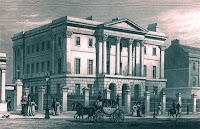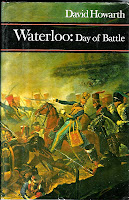 This time last year we all blogged about Waterloo for a week (I wrote about the ordinary soldiers), and so since June 18 is the exact anniversary of the battle I thought I’d find some material we didn’t cover then.
This time last year we all blogged about Waterloo for a week (I wrote about the ordinary soldiers), and so since June 18 is the exact anniversary of the battle I thought I’d find some material we didn’t cover then.
In 2004 the European community made the decision to restore the battlefield, providing a visitor center and other amenities to honor the site and attract visitors. Like many battlefields, it’s spread out over a large geographic area. Here’s the official Waterloo site.
There’s also a site for the official reenactment of the battle, which takes place every year, with some beautiful photographs, all under copyright and in a flash format, of reenactors–Napoleon and Wellington among them. And yes, this year’s reenactment is going on right now!
 If you happen to be going over to London, there’s a celebration at Apsley House, the home of the Duke, with special events this weekend.
If you happen to be going over to London, there’s a celebration at Apsley House, the home of the Duke, with special events this weekend.
And if you’re not planning to travel this weekend, you can play the Battle of Waterloo game (no, I haven’t tried it out, and don’t blame me for the timesuck this undoubtedly is).

 Restoration of the battlefield continues, the most recent effort being the restoration of Hougoumont Farm, where a strategically important part of the battle took place. The current Duke of Wellington, now in his 90s, is an enthusiastic supporter of Project Hougoumont. The opening of the Farm is timed for the two-hundred anniversary in 2015.
Restoration of the battlefield continues, the most recent effort being the restoration of Hougoumont Farm, where a strategically important part of the battle took place. The current Duke of Wellington, now in his 90s, is an enthusiastic supporter of Project Hougoumont. The opening of the Farm is timed for the two-hundred anniversary in 2015.
 For a modern perspective on the first Duke and his descendents, Lady Jane Wellesley wrote a book published last year, Wellington: A Journey Through My Family. There’s a review here with this quote:
For a modern perspective on the first Duke and his descendents, Lady Jane Wellesley wrote a book published last year, Wellington: A Journey Through My Family. There’s a review here with this quote:
I reflect on the indiscriminate, humbling power of war, and its aftermath, the way it plays havoc with people’s destiny.
Further proof that there are still treasures to be found hidden away in old houses, the Scotsman reported last year that Walter Scott had done some souvenir hunting at the battlefield:
Larry Furlong, custodian of the trust, said the banners – one French and three British – had been stored in a cupboard between Scott’s study and his library.
It is believed only a handful of people have been aware of their existence since they were brought to Abbotsford.
Have you visited Apsley House or Waterloo, or are you saving pennies for 2015? Do you enjoy reenactment activities, as participant or spectator?
SSP in fine print: New website and contest. Check it out.










